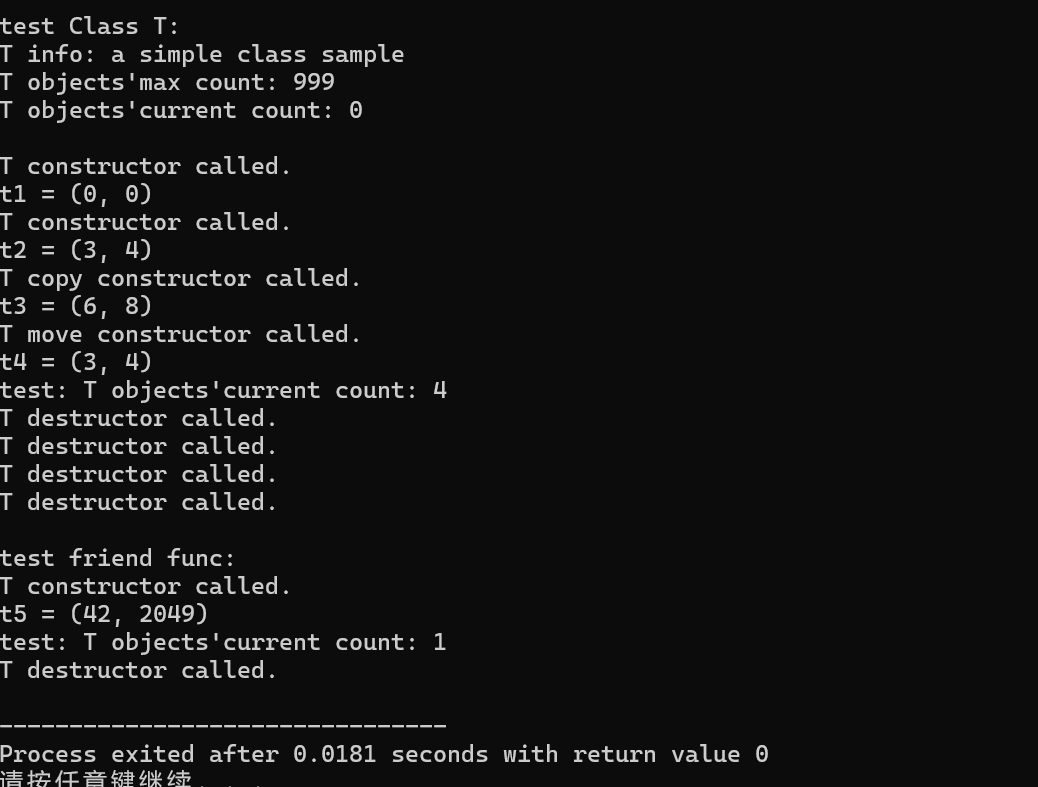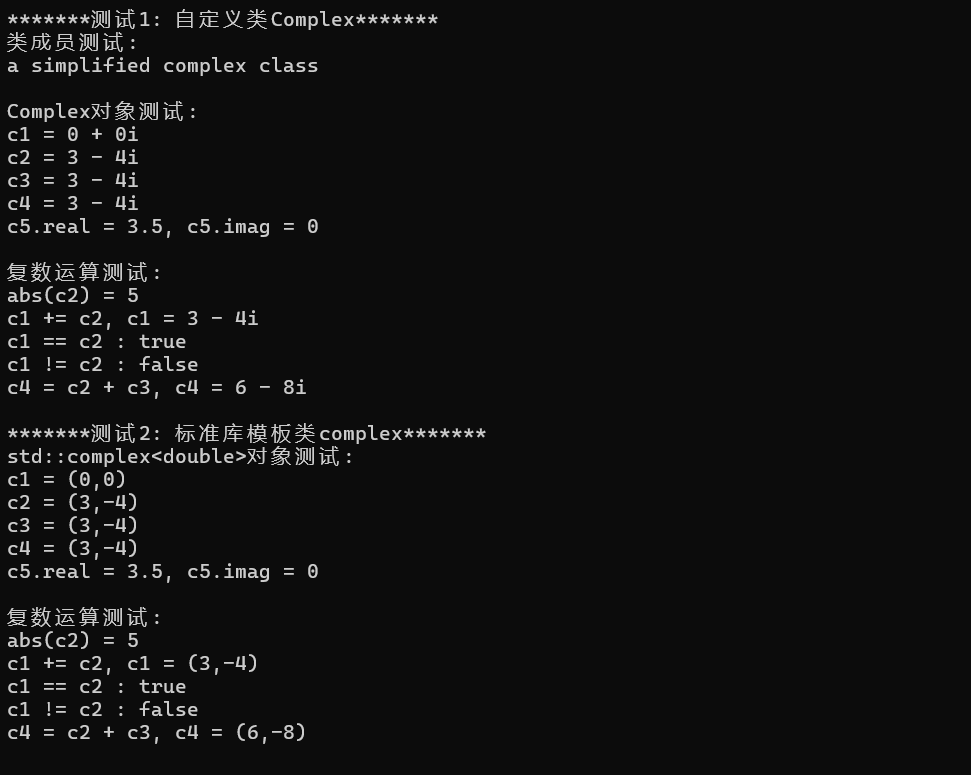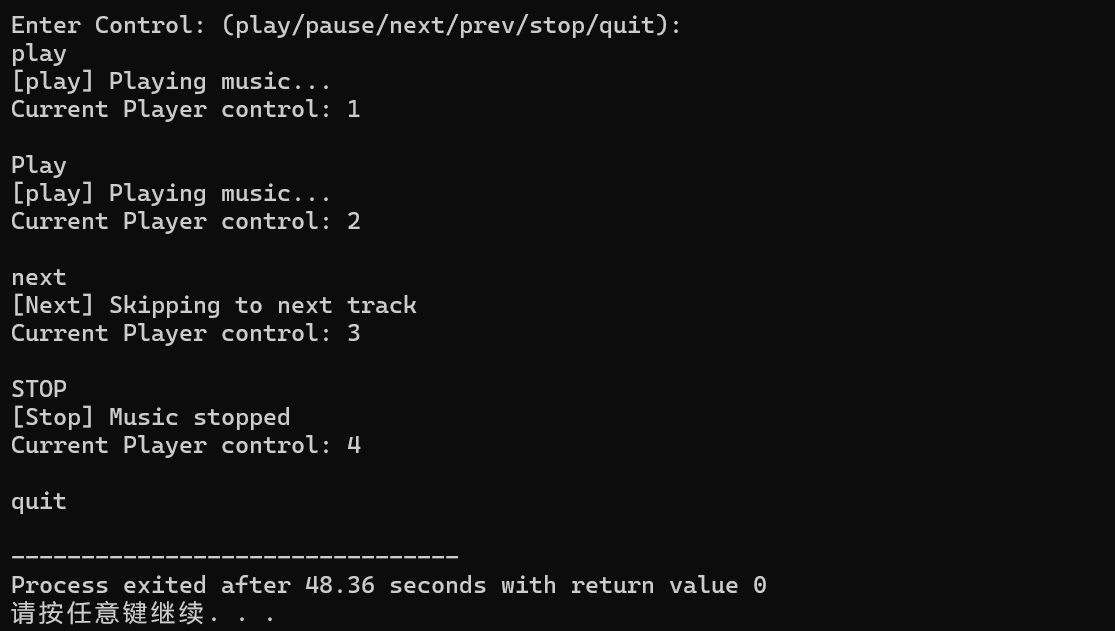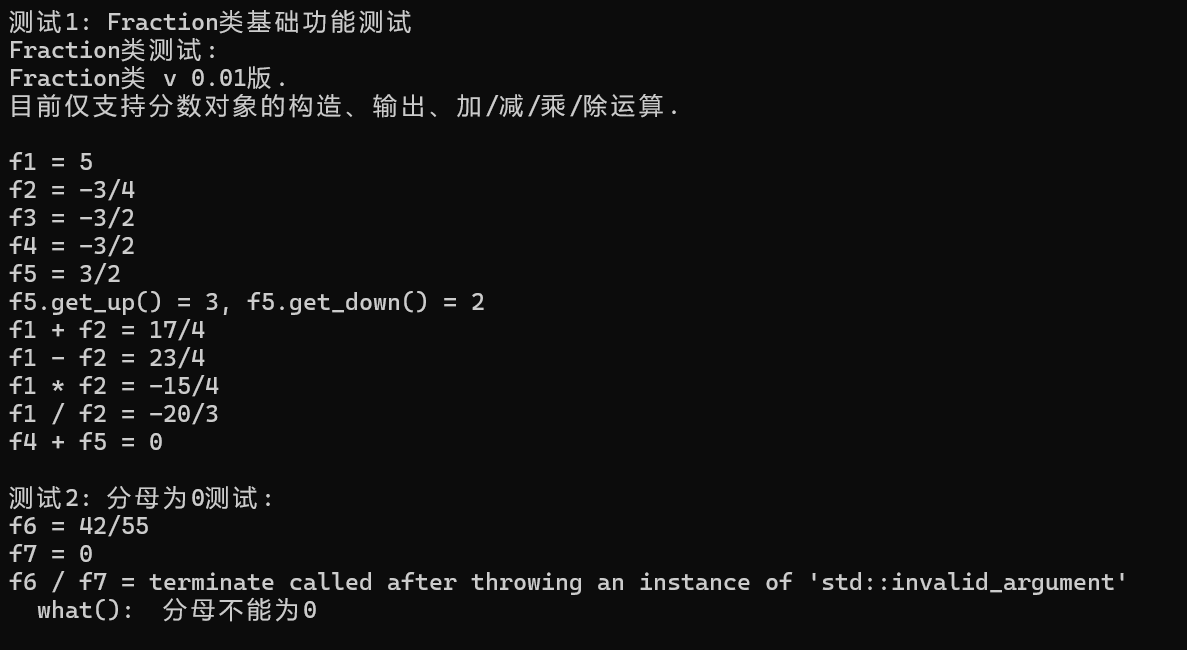实验2

#pragma once #include <string> class T { public: T(int x = 0, int y = 0); T(const T& t); T(T&& t); ~T(); void adjust(int ratio); void display() const; private: int m1, m2; public: static int get_cnt(); public: static const std::string doc; static const int max_cnt; private: static int cnt; friend void func(); }; void func();

#include "T.h" #include <iostream> #include <string> const std::string T::doc{ "a simple class sample" }; const int T::max_cnt = 999; int T::cnt = 0; int T::get_cnt() { return cnt; } T::T(int x, int y) : m1{ x }, m2{ y } { ++cnt; std::cout << "T constructor called.\n"; } T::T(const T& t) : m1{ t.m1 }, m2{ t.m2 } { ++cnt; std::cout << "T copy constructor called.\n"; } T::T(T&& t) : m1{ t.m1 }, m2{ t.m2 } { ++cnt; std::cout << "T move constructor called.\n"; } T::~T() { --cnt; std::cout << "T destructor called.\n"; } void T::adjust(int ratio) { m1 *= ratio; m2 *= ratio; } void T::display() const { std::cout << "(" << m1 << ", " << m2 << ")"; } void func() { T t5(42); t5.m2 = 2049; std::cout << "t5 = "; t5.display(); std::cout << '\n'; std::cout << "test: T objects'current count: " << T::get_cnt() << std::endl; }

#include "T.h" #include <iostream> void test_T(); int main() { std::cout << "test Class T: \n"; test_T(); std::cout << "\ntest friend func: \n"; func(); } void test_T() { using std::cout; using std::endl; cout << "T info: " << T::doc << endl; cout << "T objects'max count: " << T::max_cnt << endl; cout << "T objects'current count: " << T::get_cnt() << endl << endl; T t1; cout << "t1 = "; t1.display(); cout << endl; T t2(3, 4); cout << "t2 = "; t2.display(); cout << endl; T t3(t2); t3.adjust(2); cout << "t3 = "; t3.display(); cout << endl; T t4(std::move(t2)); cout << "t4 = "; t4.display(); cout << endl; cout << "test: T objects'current count: " << T::get_cnt() << endl; }

问题一:no ,func() 是类外定义的友元函数,需要先声明,否则找不到标识符

问题二:1:普通构造函数,初始化类T的对象,为成员变量m1、m2赋初始值 2:复制构造函数,用已存在的T类对象深拷贝创建新对象,复制其成员变量值
3:移动构造函数,用已存在的T类对象转移资源创建新对象,“窃取” 其成员变量的资源 4.析构函数,释放对象占用的资源,在对象生命周期结束时做清理工作
问题三:不可以,静态函数如果在类内会重复定义

实验任务二:

#include <string> class Complex { public: static const std::string doc; Complex(); Complex(double r); Complex(double r, double i); Complex(const Complex &other); double get_real() const; double get_imag() const; void add(const Complex &other); friend void output(const Complex &c); friend double abs(const Complex &c); friend Complex add(const Complex &c1, const Complex &c2); friend bool is_equal(const Complex &c1, const Complex &c2); friend bool is_not_equal(const Complex &c1, const Complex &c2); private: double real; double imag; };

#include "Complex.h" #include <iostream> #include <cmath> const std::string Complex::doc = "a simplified complex class"; Complex::Complex() : real(0.0), imag(0.0) {} Complex::Complex(double r) : real(r), imag(0.0) {} Complex::Complex(double r, double i) : real(r), imag(i) {} Complex::Complex(const Complex &other) : real(other.real), imag(other.imag) {} double Complex::get_real() const { return real; } double Complex::get_imag() const { return imag; } void Complex::add(const Complex &other) { real += other.real; imag += other.imag; } void output(const Complex &c) { if (c.imag >= 0) { std::cout << c.real << " + " << c.imag << "i"; } else { std::cout << c.real << " - " << -c.imag << "i"; } } double abs(const Complex &c) { return std::sqrt(c.real * c.real + c.imag * c.imag); } Complex add(const Complex &c1, const Complex &c2) { return Complex(c1.real + c2.real, c1.imag + c2.imag); } bool is_equal(const Complex &c1, const Complex &c2) { return (c1.real == c2.real) && (c1.imag == c2.imag); } bool is_not_equal(const Complex &c1, const Complex &c2) { return !is_equal(c1, c2); }

#include"Complex.h" #include <iostream> #include <iomanip> #include <complex> void test_Complex(); void test_std_complex(); int main() { std::cout << "*******测试1: 自定义类Complex*******\n"; test_Complex(); std::cout << "\n*******测试2: 标准库模板类complex*******\n"; test_std_complex(); } void test_Complex() { using std::cout; using std::endl; using std::boolalpha; cout << "类成员测试: " << endl; cout << Complex::doc << endl << endl; cout << "Complex对象测试: " << endl; Complex c1; Complex c2(3, -4); Complex c3(c2); Complex c4 = c2; const Complex c5(3.5); cout << "c1 = "; output(c1); cout << endl; cout << "c2 = "; output(c2); cout << endl; cout << "c3 = "; output(c3); cout << endl; cout << "c4 = "; output(c4); cout << endl; cout << "c5.real = " << c5.get_real() << ", c5.imag = " << c5.get_imag() << endl << endl; cout << "复数运算测试: " << endl; cout << "abs(c2) = " << abs(c2) << endl; c1.add(c2); cout << "c1 += c2, c1 = "; output(c1); cout << endl; cout << boolalpha; cout << "c1 == c2 : " << is_equal(c1, c2) << endl; cout << "c1 != c2 : " << is_not_equal(c1, c2) << endl; c4 = add(c2, c3); cout << "c4 = c2 + c3, c4 = "; output(c4); cout << endl; } void test_std_complex() { using std::cout; using std::endl; using std::boolalpha; cout << "std::complex<double>对象测试: " << endl; std::complex<double> c1; std::complex<double> c2(3, -4); std::complex<double> c3(c2); std::complex<double> c4 = c2; const std::complex<double> c5(3.5); cout << "c1 = " << c1 << endl; cout << "c2 = " << c2 << endl; cout << "c3 = " << c3 << endl; cout << "c4 = " << c4 << endl; cout << "c5.real = " << c5.real() << ", c5.imag = " << c5.imag() << endl << endl; cout << "复数运算测试: " << endl; cout << "abs(c2) = " << abs(c2) << endl; c1 += c2; cout << "c1 += c2, c1 = " << c1 << endl; cout << boolalpha; cout << "c1 == c2 : " << (c1 == c2) << endl; cout << "c1 != c2 : " << (c1 != c2) << endl; c4 = c2 + c3; cout << "c4 = c2 + c3, c4 = " << c4 << endl; }

问题一:标准库模板类complex更简洁。有内在关联,两者都是为了实现复数的运算和操作,功能逻辑一致。
问题二: 1:是,因为output、abs、add需要访问私有成员real和imag才能实现功能。
2:否。
3:当外部函数必须访问类私有成员且合理时才用friend,避免过度使用破坏封装。
问题三:把拷贝构造函数设为私有就会编译报错
实验任务三:

#pragma once #include <string> enum class ControlType {Play, Pause, Next, Prev, Stop, Unknown}; class PlayerControl { public: PlayerControl(); ControlType parse(const std::string& control_str); void execute(ControlType cmd) const; static int get_cnt(); private: static int total_cnt; };

#include "PlayerControl.h" #include <iostream> #include <algorithm> #include <string> int PlayerControl::total_cnt = 0; PlayerControl::PlayerControl() {} ControlType PlayerControl::parse(const std::string& control_str) { std::string str = control_str; std::transform(str.begin(), str.end(), str.begin(), ::tolower); total_cnt++; if (str == "play") return ControlType::Play; else if (str == "pause") return ControlType::Pause; else if (str == "next") return ControlType::Next; else if (str == "prev") return ControlType::Prev; else if (str == "stop") return ControlType::Stop; else return ControlType::Unknown; } void PlayerControl::execute(ControlType cmd) const { switch (cmd) { case ControlType::Play: std::cout << "[play] Playing music...\n"; break; case ControlType::Pause: std::cout << "[pause] Music paused\n"; break; case ControlType::Next: std::cout << "[Next] Skipping to next track\n"; break; case ControlType::Prev: std::cout << "[Prev] Back to previous track\n"; break; case ControlType::Stop: std::cout << "[Stop] Music stopped\n"; break; default: std::cout << "[Error] unknown control\n"; break; } } int PlayerControl::get_cnt() { return total_cnt; }

#include "PlayerControl.h" #include <iostream> #include <string> void test() { PlayerControl controller; std::string control_str; std::cout << "Enter Control: (play/pause/next/prev/stop/quit):\n"; while (std::cin >> control_str) { if (control_str == "quit") { break; } ControlType cmd = controller.parse(control_str); controller.execute(cmd); std::cout << "Current Player control: " << PlayerControl::get_cnt() << "\n\n"; } } int main() { test(); return 0; }

实验任务四:

#pragma once #include <string> class Fraction { public: static const std::string doc; Fraction(int up = 0, int down = 1); Fraction(const Fraction &other); int get_up() const; int get_down() const; Fraction negative() const; friend void output(const Fraction &f); friend Fraction add(const Fraction &f1, const Fraction &f2); friend Fraction sub(const Fraction &f1, const Fraction &f2); friend Fraction mul(const Fraction &f1, const Fraction &f2); friend Fraction div(const Fraction &f1, const Fraction &f2); private: int up; int down; void simplify(); int gcd(int a, int b); };

#include "Fraction.h" #include <iostream> #include <stdexcept> const std::string Fraction::doc = "Fraction类 v 0.01版.\n目前仅支持分数对象的构造、输出、加/减/乘/除运算."; Fraction::Fraction(int up, int down) : up(up), down(down) { if (down == 0) { throw std::invalid_argument("分母不能为0"); } simplify(); } Fraction::Fraction(const Fraction &other) : up(other.up), down(other.down) {} int Fraction::get_up() const { return up; } int Fraction::get_down() const { return down; } Fraction Fraction::negative() const { return Fraction(-up, down); } void Fraction::simplify() { if (down < 0) { up = -up; down = -down; } int g = gcd(std::abs(up), down); if (g != 0) { up /= g; down /= g; } } int Fraction::gcd(int a, int b) { while (b != 0) { int temp = b; b = a % b; a = temp; } return a; } void output(const Fraction &f) { if (f.down == 1) { std::cout << f.up; } else { std::cout << f.up << "/" << f.down; } } Fraction add(const Fraction &f1, const Fraction &f2) { int up = f1.up * f2.down + f2.up * f1.down; int down = f1.down * f2.down; return Fraction(up, down); } Fraction sub(const Fraction &f1, const Fraction &f2) { int up = f1.up * f2.down - f2.up * f1.down; int down = f1.down * f2.down; return Fraction(up, down); } Fraction mul(const Fraction &f1, const Fraction &f2) { int up = f1.up * f2.up; int down = f1.down * f2.down; return Fraction(up, down); } Fraction div(const Fraction &f1, const Fraction &f2) { if (f2.up == 0) { throw std::invalid_argument("分母不能为0"); } int up = f1.up * f2.down; int down = f1.down * f2.up; return Fraction(up, down); }

#include "Fraction.h" #include <iostream> void test1(); void test2(); int main() { std::cout << "测试1: Fraction类基础功能测试\n"; test1(); std::cout << "\n测试2: 分母为0测试: \n"; test2(); } void test1() { using std::cout; using std::endl; cout << "Fraction类测试: " << endl; cout << Fraction::doc << endl << endl; Fraction f1(5); Fraction f2(3, -4), f3(-18, 12); Fraction f4(f3); cout << "f1 = "; output(f1); cout << endl; cout << "f2 = "; output(f2); cout << endl; cout << "f3 = "; output(f3); cout << endl; cout << "f4 = "; output(f4); cout << endl; const Fraction f5(f4.negative()); cout << "f5 = "; output(f5); cout << endl; cout << "f5.get_up() = " << f5.get_up() << ", f5.get_down() = " << f5.get_down() << endl; cout << "f1 + f2 = "; output(add(f1, f2)); cout << endl; cout << "f1 - f2 = "; output(sub(f1, f2)); cout << endl; cout << "f1 * f2 = "; output(mul(f1, f2)); cout << endl; cout << "f1 / f2 = "; output(div(f1, f2)); cout << endl; cout << "f4 + f5 = "; output(add(f4, f5)); cout << endl; } void test2() { using std::cout; using std::endl; Fraction f6(42, 55), f7(0, 3); cout << "f6 = "; output(f6); cout << endl; cout << "f7 = "; output(f7); cout << endl; cout << "f6 / f7 = "; output(div(f6, f7)); cout << endl; }

决策理由:友元可直接访问分数类私有成员,实现输出、运算时无需通过公共接口间接获取数据,简化逻辑且保证效率。
友元优点:访问私有成员便捷,代码实现简洁;缺点:一定程度破坏封装性。
静态成员函数适用于与类紧密相关、无需访问对象私有数据的场景(如类级别的工具方法);命名空间方案适合组织多个类的通用工具函数,此处仅为分数类服务,友元更直接。




 浙公网安备 33010602011771号
浙公网安备 33010602011771号